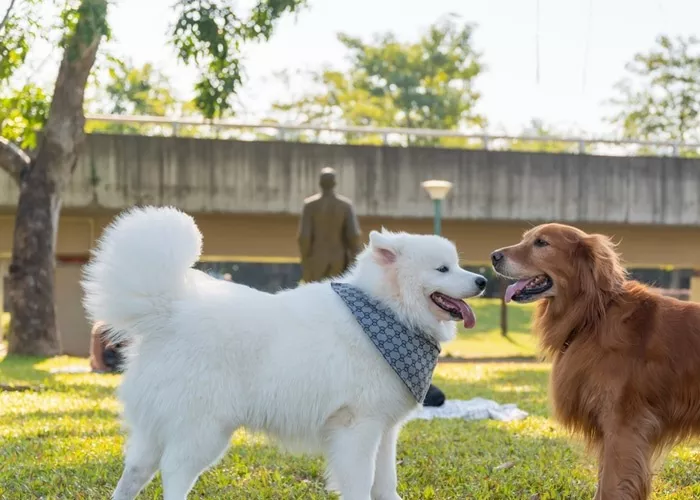When it comes to the question of whether Samoyeds are aggressive dogs, the answer is generally no. Samoyeds are widely known for their friendly and gentle nature, but like any breed, there can be individual variations influenced by various factors.
Breed Temperament
Samoyeds were originally bred by the Samoyede people in Siberia for a variety of tasks such as herding reindeer, pulling sleds, and acting as companions. Their historical role has shaped their temperament. They have a natural inclination to be sociable and cooperative with humans. This breed is often described as being extremely friendly. They are not the type of dogs that will show aggression without a reason. Samoyeds love to be around people, and they are especially good with children. Their patience and gentle demeanor make them wonderful family pets. For example, a Samoyed in a family with young kids will often tolerate the kids’ hugs, pats, and even a bit of rough – housing with great tolerance.
Appearance and Body Language
The Samoyed’s appearance also gives some clues to its non – aggressive nature. With their fluffy white coats, curled tails, and smiling faces, they have an inviting look. Their body language is usually open and friendly. When greeting people or other dogs, they wag their tails vigorously, approach with a relaxed posture, and may even jump up a little out of excitement, but this is more of a sign of friendliness than aggression. If a Samoyed feels threatened, instead of immediately showing aggression, it may first try to back away or give a low – pitched growl as a warning, which is a less – intense reaction compared to more aggressive breeds.
Socialization and Training
However, a Samoyed’s behavior can be affected by socialization and training. Proper socialization from a young age is crucial. If a Samoyed puppy is not exposed to different people, animals, environments, and situations, it may become fearful or overly protective. For instance, if a puppy is only kept in a small backyard and rarely meets strangers, when it finally encounters a new person, it may bark or show signs of anxiety. But this is not true aggression; it is a result of a lack of social experience.
Training also plays a big role. A well – trained Samoyed will respond to commands and know how to behave in different situations. Training should focus on positive reinforcement methods, such as rewarding good behavior with treats, praise, and affection. When a Samoyed is trained to follow basic commands like “sit,” “stay,” and “come,” it is easier to manage in public and around other animals. If a Samoyed shows any signs of unwanted behavior, such as growling at other dogs during a walk, consistent training can correct this behavior.
Health and Stress Factors
Health issues can also cause a Samoyed to seem aggressive. A dog in pain due to an injury or an underlying medical condition may be more irritable. For example, if a Samoyed has a toothache or a joint problem, it may snap or growl when touched in the affected area. Stress can also be a factor. Changes in the home environment, such as a new family member, a move, or the addition of a new pet, can stress a Samoyed. In such cases, the dog may show signs of restlessness or even mild aggression, but this is usually a temporary reaction to the stressor.
Interaction with Other Animals
In general, Samoyeds can get along well with other animals. When properly socialized, they can live harmoniously with cats, other dogs, and even small pets like rabbits. However, their prey drive, which is a natural instinct in dogs, may still be present. Although Samoyeds are not typically aggressive towards other animals, a small, fast – moving animal may trigger their chase instinct. But this is not the same as aggression. It is an instinctive reaction based on their genetic makeup.
Conclusion
In conclusion, Samoyeds are not aggressive dogs by nature. Their friendly and gentle temperament makes them great family pets and companions. However, like all dogs, they require proper socialization, training, and care to ensure that they grow up to be well – behaved and non – aggressive. With the right environment and upbringing, a Samoyed will bring years of love, loyalty, and joy to its owner.
Related topics


